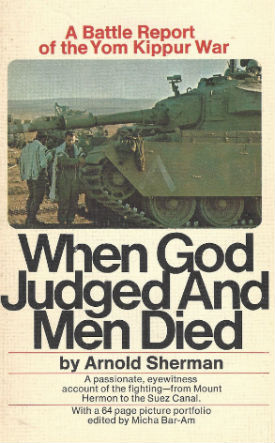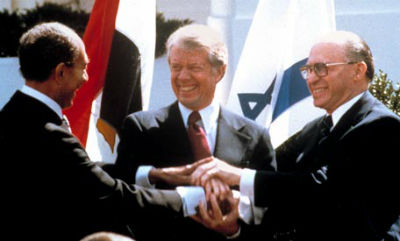Yom Kippur 1973: The War That Led to Peace
By Neil Earle
 The 1973 War stunned the world!
The 1973 War stunned the world!
My brother-in-law is fairly devout.
“Wednesday is Yom Kippur, the Day of Atonement,” he told me last week.
“Yom Kippur…hmmm.”
I was reflecting because the Day means something to me as a preacher.
On Yom Kippur October 6, 1973 I was just getting ready, as a young ministerial trainee in Regina, Saskatchewan, to climb the steps to give a sermon on the meaning of the Day of Atonement for Christians. A deacon handed me a note: “Egypt has just attacked Israel.”
That was a memorable Yom Kippur!
That week our church left for a tent meeting in Penticton, BC where speakers speculated on the possible meaning of the attack by Egypt and Syria on Israel days before. At the time in our fellowship we were inclined to take Bible prophecy very very literally and were wondering if…if this Yom Kippur War would lead the whole world into a holocaust which Bible teachers describe as the Great Tribulation.
But maybe we can all learn lesson from this. The initially successful attack on Israel that Yom Kippur actually set events in motion that led to peace between Israel and Egypt.
How so?
“Saving Face”
Historian and financier Conrad Black is often an astute observer of world events and he summarizes it very well. Israel was caught napping after their speedy victory in the Six Day War of 1967 and President Anwar Sadat of Egypt saw his moment. Egyptians forces pushed into the Sinai and bridged the supposedly impregnable Bar-Lev Line. Syrians penetrated the Golan Heights and all this took some time for the Israelis to reverse, aided by a massive airlift of 550 planes carrying supplies from the United States led by President Richard Nixon.
 Anwar Sadat, Jimmy Carter and Menachem Begin
Anwar Sadat, Jimmy Carter and Menachem Begin“The Arabs believed they had recovered their military honor with a respectable battlefield performance,” wrote Black in A Life in Full: Richard Nixon. This allowed President Sadat of Egypt to be able to make peace with the Israelis without “losing face” with his people. That peace took some years to effect with the help of President Carter in 1978 but come it did and the Camp David Accords have kept relations calm between Israel and Egypt now for 40 years.
The war that led to peace! Long may it continue. The Great Tribulation did not erupt even though we faced an Arab oil embargo that October 20, 1973 which stressed us all in the Western world. Some day perhaps the Tribulation may come and maybe in ways that some popular teachers in Bible Prophecy expect but…not in 1973.
Neither did it happen that day in 1991 when Operation Desert Storm began against Iraq. As I told 400 people at a public meeting in Toronto back then, “This was NOT the set-up for the Great Tribulation.” By then I had learned some deeper things about the Biblical prophets I did not know in 1973. (God is good!)
Peace is Possible!
Sadat and Begin of Israel showed at Camp David in 1978 that old enemies can unite, can see that the common interests pursued in peace gain much more than perpetual conflict. I’ve always felt such events need to be celebrated. Maybe, just maybe, something similar can happen between Israel and the Palestinians or Israel and the Syrians. After all, Jordan and Israel have been cooperating these past 40 years.
Maybe…just maybe, though it looks pretty bleak right now.
In the interest of thinking more deeply and more soundly in Biblical terms about the Middle East I’d like to reprint some thoughts on Israel and Palestine given by then Old Testament professor John Goldingay of Fuller Seminary back in 2009. He is a teacher versed in the nuances of the Bible and the prophets and knows how their words can be misinterpreted. So here were his reflections as part of this website’s contribution to the hope for peace between the sons of Isaac and Ishmael – two people groups so important to the peace of the Middle East and the world.
 Dr. John Goldingay
Dr. John GoldingayIsrael and Palestine: Thinking Biblically by Dr. John Goldingay (2009 Fuller Semi)
- The fact that Jewish people have been free to make themselves a home in Palestine is an expression of God’s faithfulness to them.
- We must distinguish the State of Israel and the Jewish people. I am not sure of the theological status of the State. I am sure that God remains committed to the Jewish people.
- The Palestinians trace their descent from Ishmael as the Jewish people trace their descent from Isaac. God is committed in covenant to the descendants of Ishmael as well as the descendants of Isaac (Genesis 21:18; Isaiah 19:23-25).
- Many Palestinians are our brothers and sisters in Christ, children of Abraham spiritually as well as physically.
- Britain bears a large part of the blame for the present mess for making commitments to the establishing of a national home for Jewish people in Palestine (1917) without thinking out what would then happen to the Palestinians.
- The U.S. bears a large part of the blame because of the three billion dollars worth of weapons it gives Israel each year.
- The tragedy of Israel-Palestine is that two peoples are both attached to the same land.
- Both the Palestinian people and Israeli people are traumatized by events…
- There is no harm in Christians dividing over whether to be more supportive of Israel or of the Palestinians. And there is no harm in both sides being more concerned to make their voice heard than to listen to the other. There is right and wrong, sins and needs on both sides. A good argument can help to make sure that the key issues all get raised.
- There is no solution that will feel okay to both sides.
- Sometimes God has responded when people have cried out in anguish. The main thing Christians need to do is cry out to God in anguish about the anguish of these two peoples.
There you have it. Wise but hard-hitting words from one of our best OT scholars and timely indeed for Yom Kippur – then and now!